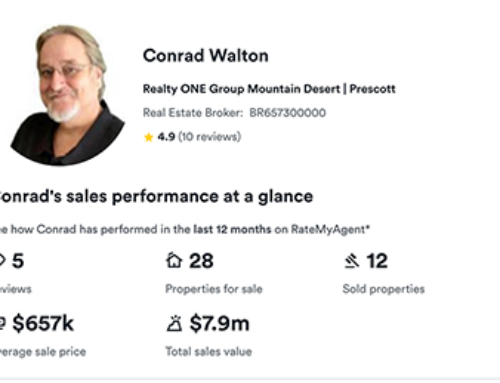This is a quick overview of what you can expect when you sell your house.
I go over the laws, the documents, and explain how things are normally done in Arizona.
Conrad 0:00
In this episode, I’m going to tell you the overall process of how to sell your Prescott Real Estate.
Conrad 0:06
This is Selling Prescott, a project of PrescottRealEstate.com. I’m Conrad Walton.
Conrad 0:22
So this episode is going to be about the overview of selling real estate in Prescott.
Conrad 0:28
It’s not going to be a lot of details. We’ll go into that in later episodes. But this is just the overall process to give you an idea of what’s involved.
Conrad 0:36
A lot of people want to sell their properties but are not familiar with the process. And there’s a lot of details to deal with.
Conrad 0:42
So the first place to start is at the beginning, and talk about why do you want to sell your property? Are you ready to sell your property? Are you going to think about it for a while? Is it going to be a short process, or a long process? You’ve got to figure out your timing. Are you going to sell in the short term, Oh, my gosh, I need it right away? Or are you going to sell it in a while? Can you take your time to sell it? And what’s your goal in selling your property?
Conrad 1:10
If you’re moving away, if you have a requirement to get out, that’s one thing that impacts your timing. If you just want to downsize, then timing is not so much. And maybe you want to maximize how much money you make out of it, sell it today for less money and get out of it, or wait for a while and take top dollar. So you’ve got to decide those things out front before you do anything else.
Conrad 1:35
The next step is you got to find an agent. There’s a lot of people that want to sell them, you know, for sale by owner called FSBO, FSBO FSBO. And you can do that if you want to do that. But if anything blows up, if anything comes back on you, you’re going to be liable for things and where there’s a lot of money involved, people get really upset and court cases happen.
Conrad 1:59
So make sure you know what you’re doing. I would suggest you find an agent. And an agent, what an agent is going to do for you is, they’re going to, they, first off, they know the process. They know the documents, they know what to expect. They know what the potential pitfalls are liabilities, they know what you could get sued for. And they’re going to protect you from that.
Conrad 2:24
So think of your agent as your paid assassin, your Ninja Warrior that’s going to go out there and fight for your interests and help you accomplish what you want to accomplish. They’re the ones that know what’s going on so, so trust that agent.
Conrad 2:38
You need to find an agent that has some experience, who’s been through some battles. And I will say that real estate is a war. It doesn’t seem like that. Everybody’s really nice. Real estate agents are nice. But when it gets down to it, and there’s money involved, things can get. We’ll call it confrontational. So we need to protect against that you have to have somebody who’s been through some of those wars, and knows what to look for and how to defend you in that kind of stuff.
Conrad 3:08
What you don’t want to do is pick an agent who is a friend of a friend, or you know somebody from church or some social function or, you know, your, you know, grocer’s mother in law happens to be an agent or something like that.
Conrad 3:27
You’re going to tend to want to do that because trust, you know, you think he can trust people because you know them, because they’re a friend of a friend. And that’s one thing, but I’d rather have somebody I didn’t really get along with, who’s willing to go out there and fight to the death for me.
Conrad 3:44
So it’s more important what the capabilities of the agent are, than how well you know them, if that makes sense.
Conrad 3:53
The third point is “pricing your property” and really talk to your agent about this. The agent is going to know the neighborhood. They’re going to run comps, which is comparative properties, what properties sold for in the past that are comparable to your property. Some properties are very uniform, in some neighborhoods, and it’s easy to run comps. Other places, like I do listings in Walker primarily, which are mountain cabins, and we go from a $75,000, you know, eight by 10 cabin, up to a $2.6 million log home, so there’s no uniformity. It’s hard to run comps, so rely on your agent to to get just the right price for you.
Conrad 4:42
This is where your value is, do I need to “oh my gosh” sell right now? “I need it gone by next Tuesday. I’ll take low dollar but I got to get out.” Versus, on the other end, of that scale, is the “I want top dollar and I’ll wait six months to get it. I don’t care.” You know, and you have to decide that.
Conrad 5:02
A good agent, on pricing is going to give you a range, not a, you know, “what’s my house worth?” “Well, it’s worth, you know, $485,000, 500.” You know, it doesn’t work like that. The market is a, is a fluid market, and there are no hard and fast rules. So you’re going to get a, you’re going to get a range.
Conrad 5:22
I suggest, if you wait for the top dollar, it’s going to be a while and you’ll probably ultimately get it, but maybe not. And if you don’t get it, you’re going to have to lower your price. And you may end up selling for even less money, if you push that too hard. But talk to your agent trust them on what they want to do.
Conrad 5:43
The next point is “Commissions”. Who pays for what?
Conrad 5:46
Now the way things are set up right now. And I’m going to talk in conventions right now. There’s no, there’s no rules to this, there’s no law.
Conrad 5:56
There’s even some controversy about how this works. Right now, conventionally, the listing agent, the listing contract, that pays a total commission to that listing contract.
Conrad 6:09
What the, what that agent’s going to do, is split that in half, normally, I’m conventionally at 6%. 3%, the selling agent is going to keep, and 3% the buyer’s agents gonna keep.
Conrad 6:25
When I, as a listing agent, put your house in the MLS, I put a percentage in there, a compensation amount, and I’ll say 3% to any buyer. That’s actually a contract to any other licensed agent. If they bring a ready, willing, and able buyer, that and we come to a contract and agreement, then I owe them that 3%.
Conrad 6:49
So conventionally, that’s what happens. I will tell you, in real estate, as in life, everything is negotiable. You can negotiate what that commission is, and how it gets split. And, you know, talk to your agent about that. It’s between you and your agent. And whatever you guys agree on, I will say that vacant land is harder to sell, takes longer to sell. And convention on that is 10%. 5% for each side. Normal house is 6%. 3% on each side.
Conrad 7:22
if you get up to $800,000, or million dollar house, I might do it for four or 5%. You know, talk to your agent, again, negotiate that. If you get down, I mean, if you have a $50,000 vacant lot, and I’m working hard to sell it, you know your percentage on that at 10% is a $5,000 Commission. Well, if I sell a $300,000 house at 3%, that’s a $9,000 Commission. So you know, percentages, dollars, the price point all those things are factors in the commission. So negotiate everything, talk to your agent about that.
Conrad 8:05
The listing contract, when you get a listing contract from your agent, the details in that thing matter. Just go through everything. Figure out exactly, you know, what you want to do. Read the whole thing completely. And that’s gonna have pricing and some things in there that we’ve already talked about.
Conrad 8:22
So after you’ve got a listing contract written and agreed to, and you’ve got an agent, and the agent is working for you, then the next thing you need to do is “Disclosure Documents.”
Conrad 8:33
There could be a number of those, depending on your situation, HOA, well, septic, things like that. But “spuds” SPDS, is your disclosure, and you need to disclose everything in that thing.
Conrad 8:48
We’re all nice, now everybody’s being nice, and negotiating up front. But when it comes down to it, if you didn’t disclose something that you knew about, then you could be liable for that later.
Conrad 9:00
I just read an article, there was an agent and the sellers were selling a house in the Hollywood Hills that was on stilts, and it wasn’t built very well. So they went under contract, went into escrow, did an inspection on it. They had a geological inspection that said that if there’s an earthquake, this thing is going to fall down. It wasn’t built well enough.
Conrad 9:22
And they’ve got that official inspection notice they knew that. So that escrow fell apart. So they put it back on the market, somebody else bought it.
Conrad 9:31
They did not disclose that geological report. And the Northridge earthquake happened, and the house fell, and two people were killed, and it costs them millions and millions of dollars in liability. They were sued for the death of two people.
Conrad 9:47
So if you know anything, you need to disclose it. And you might be afraid of that. You might be thinking “I don’t really want to tell him about the mold in the attic”, or something like that.
Conrad 9:59
It is better to disclose everything. Because what happens generally, is the buyer looks at this document, it’s like five pages long, and they’re going through it and their mind goes numb, and they don’t really pay a lot of attention to the details. Maybe their agent will point out, “Hey, are you aware of this or aware of that?”
Conrad 10:18
But it’s best to disclose everything. Disclose it now, lose a sale, is much better than getting sued later in court. Courts are not good.
Conrad 10:28
Okay, so now, we got buyers coming to look at it, “Staging and Showing.”
Conrad 10:34
Think about everything from the buyers point of view. I know that you have had your house for 100 years, you raised your kids, you’ve got emotional attachment, you love your house, and I get that you have pictures of your family on the walls, you have personal momentos all over the place. Maybe you have diplomas on the wall, or things like that.
Conrad 10:58
Get rid of all your personal stuff.
Conrad 11:00
Think about this, from the buyers point of view.
Conrad 11:02
You don’t matter. I don’t care what you think, I don’t care what you feel. We’re trying to sell your house now. And all I care about is what that buyer thinks. You’ve got to get the buyer to come in the door and think, “Ah, this could be my home.”
Conrad 11:16
You need to get them to picture themselves in your house. So if they see a picture of your aunt or your grandbaby or, you know, a wedding picture. That’s not them. And they’re like, “Oh, this is somebody else’s house, I’m intruding”. That makes them uncomfortable, and they’re not going to buy your house. So no personal stuff.
Conrad 11:38
Don’t be there when it’s being shown. If you hover around, they’re going to feel very much like “This is not my home and I cannot picture myself here.”, and you just lost that sale. So go for a walk. Go away. Don’t talk to them. Let the agents deal with it. That’s what you’re paying them for.
Conrad 11:57
So now we have “Responding to Offers.”
Conrad 12:01
You can accept an offer, you can reject an offer, or you can counter an offer.
Conrad 12:07
Somebody, you know, say you’re asking $500,000, and they offer you $450. Well, you can counter it $475. And you can play that game. And $485. Now I’ll give it you know, $480, you know, no, I want $482. You can play that game all you want.
Conrad 12:24
I personally love that. Most people don’t. That’s fine.
Conrad 12:28
Another thing that could happen is you get multiple offers. You can do multiple counter offers, talk to your agent about that. If you get into a bidding war, you can just lay out whatever price you want.
Conrad 12:40
Again, everything is negotiable. I don’t care what you’re asking, I don’t care. You know what the MLS says, if you don’t want to give, you know, accept an offer from somebody, then don’t accept the offer.
Conrad 12:54
If you want to counter them, counter them higher, things are going for more money than they’re asking for this market. Right now, as I’m recording this, this market is a seller’s market, and they go for $20,000, $40,000, $50,000, over asking price.
Conrad 13:10
So if you can get into that situation. Just, just be aware. Again, go back to your agent, ask them the best way to negotiate your way through these offers. If you’re desperate, and you want to just get it sold, and they offer you, you know, $275, take it and we’re done.
Conrad 13:27
So whatever you want to agree to, don’t be pressured in anything. Don’t get anxious. Don’t, you know, think “Oh my gosh! If I don’t take this one, I’ll never get another offer!” No, you’ll get another offer. There’s always another deal. There’s always another buyer.
Conrad 13:44
Stand firm and you’ll be surprised how well you can negotiate.
Conrad 13:48
I personally love negotiating with people, grinding them for that last nickel. A lot of agents don’t, and a lot of both buyers and sellers, just freak out in that kind of a situation, and cave when they shouldn’t have caved. So hang in there. Be tough. You’ll get what you want.
Conrad 14:08
Once you accept an offer, then you go into escrow and title. The buyer traditionally picks the escrow company and escrow companies are neutral third parties.
Conrad 14:19
Most all of them around town do a good job. The thing you want to work out there is communication. Sometimes they don’t communicate as well as you’d like. So don’t be afraid to be on your escrow agent, asking “Where’s this doc? How’s this going? Did we get a loan appraisal yet?” You know, bug them, and they’ll do a good job for you.
Conrad 14:38
Talk directly to the escrow company. They’ll communicate directly to you, and talk about, you know, account numbers, and wire transfers, and all that stuff. Talk directly to them. They’re also going to talk to you about signing docs.
Conrad 14:51
Do what the escrow agent tells you to do. Don’t accept anything from anybody else. If you get any kind of a weird email, check with your escrow agent. Call them up and go, “Hey, is this real? What’s going on?”
Conrad 15:05
So now we’re in escrow. The buyer has an inspection period, a couple weeks usually, and they can inspect anything they want. They should have a home inspector come out there, 300 to 500 bucks on something like that.
Conrad 15:18
At the end of that inspection period, regardless of what they find, or don’t find, they can bail for any reason at all. They can look at it and go, “Man, I don’t like the flowers in the front yard. I don’t want this.” And they have every right to reject the property and walk away and keep their earnest money.
Conrad 15:36
So you don’t really really have a firm deal until you get through that inspection period. Got to give them access, have, you know, electric and water turned on, and all that stuff. And again, they can inspect it any way they want, with anybody they want, as many times as they want. And they can bail for any reason on that.
Conrad 15:58
They can, at the end of the inspection, they either can accept it the way it is, they can reject it and walk away. or they can ask for repairs. And a lot of times instead of doing repairs, because that’s such a hassle, you just say “How about I throw you 10 grand in lieu of repairs”, and they agree to that, and, you know, it’s like, “Fine, I’ll give you money. I don’t want to fix the railing on the deck or, you know, whatever.”
Conrad 16:24
So that’s the inspection period. Once you get through the inspection period, and you still have a deal, then if they have a loan on it, financing is the next hurdle to get over. They’ve got to have a loan approval, probably going to be a home inspection on that, from the lender, gonna come out, and make sure the house hasn’t burned down or and is generally as it is presented. They’re protecting themselves on that. There’s going to be an appraisal. They might have an appraiser come out and go “Now this isn’t worth 500,000, it’s only worth 350.” And that can get you into some problems.
Conrad 17:04
If you if you fail on the appraisal contingency, then the buyer can walk at that point.
Conrad 17:11
Or they can say well, “I’ll throw in another $100,000 cash to make up the difference.”, that’s going to be up to them. And again, that’s another point that they can walk on.
Conrad 17:20
So getting your appraisal to come in, is a big deal.
Conrad 17:24
Cash is king. If anybody offers you cash, take it. No appraisals, no contingencies, wire the money, here’s your house, boom, we’re done.
Conrad 17:34
So the lender also might require you to do some changes to the house or fix some things. So you know, be aware that might happen also.
Conrad 17:43
So now we’ve gotten through the whole process, we’re getting down to closing, you’re going to get a closing statement, and that statement is going to be prorated taxes and who paid for half a tank of propane. And maybe there was some concessions on one side or another. There’s a whole bunch of things or loan fees or you know, appraisal costs or septic inspection or who knows.
Conrad 18:11
All of that stuff is going to be on a statement as far as what the seller owes what the buyer owes. And it all comes out at the bottom and balances. Property taxes get prorated, and in Yavapai County, we pay them in arrears. So that’s kind of a weird thing,. Go through the math on that. You’re always going to have a question on that.
Conrad 18:33
Talk to your escrow agent. And they’ll walk you through the statement and and they’ll explain everything to you. Make sure that’s right.
Conrad 18:39
It’s not always right. Sometimes they misunderstood. Or maybe I forgot as the listing agent, tell them something, or told him something incorrect. So make sure that that is correct.
Conrad 18:52
The next step after that, you sign your closing docs, and then you sit back and you wait for them to record.
Conrad 19:00
They get all those documents together, you have title insurance and a lot of other documents. And they send a person down to the courthouse stands in line goes up to the counter, hands them the recording documents, although I think they do this online. Now, the last couple years that happened.
Conrad 19:20
And once that gets recorded with the County Recorder at the courthouse, then you no longer own the home. If they do it at two o’clock, it’s as of two o’clock. As soon as that’s recorded, the new buyer is the new owner, and they get the keys. They get the access. Your agent again will handle all that.
Conrad 19:41
And it’s not yours anymore. And that could be a hard emotional thing because you miss that house and you love that house. Or it could be a very exciting, and celebratory occasion, because, look at all the money you just made.
Conrad 19:55
So you know after you record, normally you’re going to get your money wired to you from the escrow company. And that normally takes an overnight. It could be the same day, but it might be the next day. If you don’t get it by next day two o’clock, call your escrow company and ask them about that.
Conrad 20:13
And at that point, you walk away and your house is sold. And, again, that could be a very exciting thing. Could be a sad thing. But you’ve gone through the process, you made it out alive, and everything’s gonna be okay.
Conrad 20:29
Thanks for listening. Please drop a review wherever you get your podcasts. If you have any questions or need any help with real estate in Prescott, please give me a call or text me at 928-925-4428. You can email me at Conrad at PrescottRealEstate.com. You can always contact me through the website where you can also get show notes with information about this episode. That’s PrescottRealEstate.com.
Conrad 20:29
The key to life is gratitude. So stay thankful







Leave A Comment